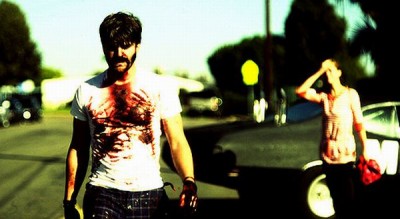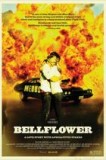| Reviews & Columns |
|
Reviews DVD TV on DVD Blu-ray 4K UHD International DVDs In Theaters Reviews by Studio Video Games Features Collector Series DVDs Easter Egg Database Interviews DVD Talk Radio Feature Articles Columns Anime Talk DVD Savant Horror DVDs The M.O.D. Squad Art House HD Talk Silent DVD
|
DVD Talk Forum |
|
|
| Resources |
|
DVD Price Search Customer Service #'s RCE Info Links |
|
Columns
|
|
|
Bellflower

Evan Glodell's Bellflower begins with one of the oddest Meet-Cutes you've ever seen. Woodrow (Glodell) and his buddy Aiden (Tyler Dawson) are hanging out in a bar when their big promotion of the night is announced: a cricket-eating contest. The prize is nominal, but it's just the kind of thing that sounds like fun when you're half in the bag, and Woodrow likes the looks of Milly (Jessie Wiseman), the first girl to volunteer, so he's in. She destroys him, but they get to talking afterwards; she's got a terrific, wide smile, and an endearing way of calling him "buddy," and she isn't thrown by his response when she asks what he does ("I'm building a flamethrower"). He gets her phone number.
One of the many things that Bellflower gets exactly right is that palpable thrill of finding someone who is genuinely interesting, who you can't wait to see and talk to again. That's a feeling that comes across in films less often than you'd think; more often than not, the attraction between leading characters occurs because it seems pre-determined, motored by the script rather than the chemistry. The vibrations that come off of these two characters are so skillfully conveyed, and we buy their attraction with such unquestioned acceptance, that the strange turns their story takes are received without much resistance.
They meet again. In a turn easier to swallow than you might expect, their first date takes them from California to Texas. She is impressed by his car, which includes a whiskey spout ("It's like a James Bond car for drunks"). He's immediately asking her to be his girlfriend, but she is reluctant. "Things will go bad," she says, forebodingly, "because that's what always happens."
And then, intriguingly, just as their relationship is coming together, Glodell jumps ahead, to its end. It's a ballsy move, narratively speaking, but efficient--the beginning and the end of a relationship are what makes them unique, and the middle is usually (mostly) the same. An indeterminate amount of time has passed; facial hair has sprouted, hairstyles are different, tension has boiled up. The despair of the break-up is captured as effectively as the tentative beginnings, as are the bad choices that follow. Things, it can be said without giving much away, begin to get out of hand.
You're not sure where the hell Bellflower is going from scene to scene; there's an unpredictability to the picture that slowly and subtly gets scary. By the third act, it has become quite a different movie than the one it began as (aside from a creepy prologue, hinting in a literally backwards fashion at things to come). The violence, when it happens, happens like that, and then its over--walloping the viewer, as it often does in real life.
The film's firm anchoring in a recognizable reality (albeit one in which time and place is somewhat unclear) is its greatest asset. I know these people, I kept thinking throughout: guys like Aidan, who use drunken vulgarity as a defense mechanism, girls like Milly who live on being up for anything and hold on to that philosophy for too long, guys like Woodrow who seem sweethearts while bottling up gallons of pure rage, girls like Milly's friend Courtney, devastatingly pretty, yet siphoning most of their personality from their ever-present friend, and a little lost without them. Their interactions aren't always the stuff of high wit (the dialogue is peppered with casual "dude"s and "awesome"s), but it's realistic--though we do wonder, from time to time, how they subsidize this lifestyle (their days are a blur of boozing and hanging out, but certainly not going to jobs).
The film's most memorable performance is that of Wiseman, who is both crushingly beautiful and utterly natural--you fall for her just as Woodrow does, if not before. In early scenes, in fact, she somewhat overshadow the seemingly-bland Glodell, but that's mostly set-up for the second (and much darker) half of his complex performance. As Courtney, Rebekah Brandes is delicately wonderful; again, she seems mostly just a pretty face, but she has a hook-up scene late in the film where she gets every detail right. Dawson gets to have the most fun, but he has one line ("You know I had a crush on her though, right?") that is delivered with such quiet power that it refocuses the entire performance.
Joel Hodge's cinematography is striking, but takes some chances that honestly don't work; he does some focus play, particularly in the first half, that renders up to half the frame a blur, a flashy device which undercuts (though not lethally) the intimate, home-made, handcrafted feel of the picture. And after over a week of careful consideration, I must admit that the ending doesn't work; it cops out on its darker turns, though whether they even play is (at the very least) debatable, and then seems to second guess that choice, jerking our chain over and over to a degree that becomes a bit exhausting. But Bellflower is, nonetheless, a fascinating and worthwhile movie; if they'd found an ending that worked (or even settled on one), it might have been a masterpiece.
Jason lives in New York. He holds an MA in Cultural Reporting and Criticism from NYU.
|
| Popular Reviews |
| Sponsored Links |
|
|
| Sponsored Links |
|
|
| Release List | Reviews | Shop | Newsletter | Forum | DVD Giveaways | Blu-Ray | Advertise |
|
Copyright 2024 DVDTalk.com All Rights Reserved. Legal Info, Privacy Policy, Terms of Use,
Manage Preferences,
Your Privacy Choices | |||||||











